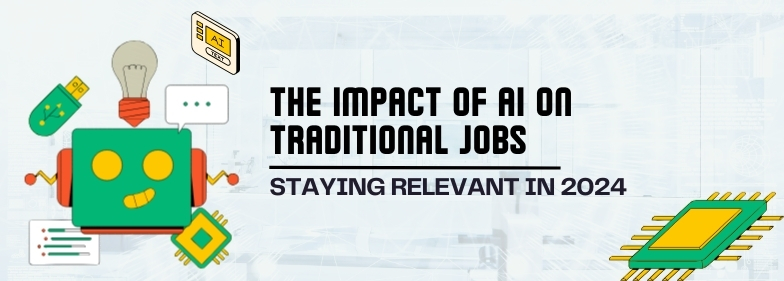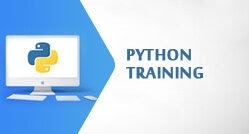The Impact of AI on Traditional Jobs: Staying Relevant in 2024

The Impact of AI on Traditional Jobs: How to Stay Relevant in 2024
As artificial intelligence (AI) continues to evolve, its influence on the job market is becoming increasingly pronounced. Traditional roles are being transformed, and professionals across various industries are feeling the pressure to adapt. In this blog, we’ll explore the impact of AI on traditional jobs and offer strategies for staying relevant and transitioning into AI-driven roles in 2024.
Understanding the Impact of AI on Traditional Jobs
AI is reshaping the job landscape in several ways:
- Automation of Routine Tasks: AI can handle repetitive and mundane tasks more efficiently than humans, leading to automation in areas such as data entry, customer service, and manufacturing.
- Enhanced Decision-Making: AI algorithms can analyze vast amounts of data to support decision-making processes, affecting roles in finance, healthcare, and management.
- New Job Roles and Skills: While AI may displace some jobs, it also creates new opportunities that require a different set of skills, such as AI ethics, data analysis, and machine learning engineering.
Strategies to Stay Relevant in the AI Era
1. Upskill and Reskill
One of the most effective ways to stay relevant is to continuously update your skill set. Here are some areas to focus on:
- Data Literacy: Understanding how to work with data is crucial. Learn the basics of data analysis, data visualization, and statistical methods.
- Programming: Familiarize yourself with programming languages commonly used in AI, such as Python and R.
- AI and Machine Learning: Take courses on AI and machine learning to understand the fundamentals and applications of these technologies.
2. Embrace Lifelong Learning
The rapid pace of technological change means that learning should be a continuous process. Stay curious and open to new knowledge by:
- Attending Workshops and Seminars: Participate in industry conferences, webinars, and workshops to stay updated on the latest trends and developments in AI.
- Reading Industry Publications: Subscribe to journals, magazines, and blogs that focus on AI and technology.
3. Develop Soft Skills
While technical skills are important, soft skills are equally crucial for career advancement. Focus on enhancing:
- Critical Thinking: The ability to analyze problems and make informed decisions is invaluable.
- Adaptability: Being open to change and willing to learn new tools and techniques can help you navigate the evolving job landscape.
- Communication: Strong communication skills are essential for collaborating with diverse teams and explaining complex concepts to non-technical stakeholders.
4. Seek Cross-Functional Roles
AI is interdisciplinary by nature, and cross-functional roles are becoming more common. Consider roles that allow you to work at the intersection of AI and your current field, such as:
- AI Project Manager: Overseeing AI projects and ensuring they align with business goals.
- AI Consultant: Advising organizations on how to implement AI solutions to improve their operations.
- Data Analyst: Using AI tools to derive insights from data and inform business strategies.
5. Network with AI Professionals
Building a strong professional network can open doors to new opportunities and provide valuable insights into the AI industry. Engage with AI professionals by:
- Joining Professional Associations: Become a member of organizations like the Association for the Advancement of Artificial Intelligence (AAAI) or the Institute of Electrical and Electronics Engineers (IEEE).
- Participating in Online Communities: Join LinkedIn groups, forums, and social media communities focused on AI and technology.
Conclusion
The impact of AI on traditional jobs is undeniable, but it also presents numerous opportunities for growth and innovation. By upskilling, embracing lifelong learning, developing soft skills, seeking cross-functional roles, and networking with AI professionals, you can stay relevant and thrive in the AI-driven job market of 2024. Adaptability and a proactive approach to learning will be your greatest assets in this ever-evolving landscape.
The Impact of AI on Traditional Jobs: How to Stay Relevant in 2024
As artificial intelligence (AI) continues to evolve, its influence on the job market is becoming increasingly pronounced. Traditional roles are being transformed, and professionals across various industries are feeling the pressure to adapt. In this blog, we’ll explore the impact of AI on traditional jobs and offer strategies for staying relevant and transitioning into AI-driven roles in 2024.
Understanding the Impact of AI on Traditional Jobs
AI is reshaping the job landscape in several ways:
- Automation of Routine Tasks: AI can handle repetitive and mundane tasks more efficiently than humans, leading to automation in areas such as data entry, customer service, and manufacturing.
- Enhanced Decision-Making: AI algorithms can analyze vast amounts of data to support decision-making processes, affecting roles in finance, healthcare, and management.
- New Job Roles and Skills: While AI may displace some jobs, it also creates new opportunities that require a different set of skills, such as AI ethics, data analysis, and machine learning engineering.
Strategies to Stay Relevant in the AI Era
1. Upskill and Reskill
One of the most effective ways to stay relevant is to continuously update your skill set. Here are some areas to focus on:
- Data Literacy: Understanding how to work with data is crucial. Learn the basics of data analysis, data visualization, and statistical methods.
- Programming: Familiarize yourself with programming languages commonly used in AI, such as Python and R.
- AI and Machine Learning: Take courses on AI and machine learning to understand the fundamentals and applications of these technologies.
2. Embrace Lifelong Learning
The rapid pace of technological change means that learning should be a continuous process. Stay curious and open to new knowledge by:
- Attending Workshops and Seminars: Participate in industry conferences, webinars, and workshops to stay updated on the latest trends and developments in AI.
- Reading Industry Publications: Subscribe to journals, magazines, and blogs that focus on AI and technology.
3. Develop Soft Skills
While technical skills are important, soft skills are equally crucial for career advancement. Focus on enhancing:
- Critical Thinking: The ability to analyze problems and make informed decisions is invaluable.
- Adaptability: Being open to change and willing to learn new tools and techniques can help you navigate the evolving job landscape.
- Communication: Strong communication skills are essential for collaborating with diverse teams and explaining complex concepts to non-technical stakeholders.
4. Seek Cross-Functional Roles
AI is interdisciplinary by nature, and cross-functional roles are becoming more common. Consider roles that allow you to work at the intersection of AI and your current field, such as:
- AI Project Manager: Overseeing AI projects and ensuring they align with business goals.
- AI Consultant: Advising organizations on how to implement AI solutions to improve their operations.
- Data Analyst: Using AI tools to derive insights from data and inform business strategies.
5. Network with AI Professionals
Building a strong professional network can open doors to new opportunities and provide valuable insights into the AI industry. Engage with AI professionals by:
- Joining Professional Associations: Become a member of organizations like the Association for the Advancement of Artificial Intelligence (AAAI) or the Institute of Electrical and Electronics Engineers (IEEE).
- Participating in Online Communities: Join LinkedIn groups, forums, and social media communities focused on AI and technology.
Conclusion
The impact of AI on traditional jobs is undeniable, but it also presents numerous opportunities for growth and innovation. By upskilling, embracing lifelong learning, developing soft skills, seeking cross-functional roles, and networking with AI professionals, you can stay relevant and thrive in the AI-driven job market of 2024. Adaptability and a proactive approach to learning will be your greatest assets in this ever-evolving landscape.




























